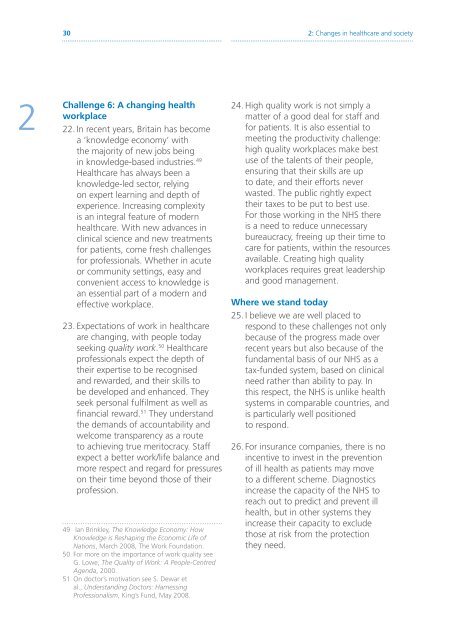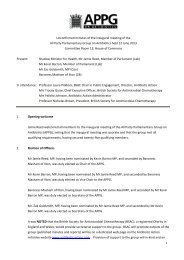High quality care for all NHS Next Stage Review - Antibiotic Action
High quality care for all NHS Next Stage Review - Antibiotic Action
High quality care for all NHS Next Stage Review - Antibiotic Action
You also want an ePaper? Increase the reach of your titles
YUMPU automatically turns print PDFs into web optimized ePapers that Google loves.
30 2: Changes in health<strong>care</strong> and society2Ch<strong>all</strong>enge 6: A changing healthworkplace22. In recent years, Britain has becomea ‘knowledge economy’ withthe majority of new jobs beingin knowledge-based industries. 49Health<strong>care</strong> has always been aknowledge-led sector, relyingon expert learning and depth ofexperience. Increasing complexityis an integral feature of modernhealth<strong>care</strong>. With new advances inclinical science and new treatments<strong>for</strong> patients, come fresh ch<strong>all</strong>enges<strong>for</strong> professionals. Whether in acuteor community settings, easy andconvenient access to knowledge isan essential part of a modern andeffective workplace.23. Expectations of work in health<strong>care</strong>are changing, with people todayseeking <strong>quality</strong> work. 50 Health<strong>care</strong>professionals expect the depth oftheir expertise to be recognisedand rewarded, and their skills tobe developed and enhanced. Theyseek personal fulfilment as well asfinancial reward. 51 They understandthe demands of accountability andwelcome transparency as a routeto achieving true meritocracy. Staffexpect a better work/life balance andmore respect and regard <strong>for</strong> pressureson their time beyond those of theirprofession.49 Ian Brinkley, The Knowledge Economy: HowKnowledge is Reshaping the Economic Life ofNations, March 2008, The Work Foundation.50 For more on the importance of work <strong>quality</strong> seeG. Lowe, The Quality of Work: A People-CentredAgenda, 2000.51 On doctor’s motivation see S. Dewar etal., Understanding Doctors: HarnessingProfessionalism, King’s Fund, May 2008.24. <strong>High</strong> <strong>quality</strong> work is not simply amatter of a good deal <strong>for</strong> staff and<strong>for</strong> patients. It is also essential tomeeting the productivity ch<strong>all</strong>enge:high <strong>quality</strong> workplaces make bestuse of the talents of their people,ensuring that their skills are upto date, and their ef<strong>for</strong>ts neverwasted. The public rightly expecttheir taxes to be put to best use.For those working in the <strong>NHS</strong> thereis a need to reduce unnecessarybureaucracy, freeing up their time to<strong>care</strong> <strong>for</strong> patients, within the resourcesavailable. Creating high <strong>quality</strong>workplaces requires great leadershipand good management.Where we stand today25. I believe we are well placed torespond to these ch<strong>all</strong>enges not onlybecause of the progress made overrecent years but also because of thefundamental basis of our <strong>NHS</strong> as atax-funded system, based on clinicalneed rather than ability to pay. Inthis respect, the <strong>NHS</strong> is unlike healthsystems in comparable countries, andis particularly well positionedto respond.26. For insurance companies, there is noincentive to invest in the preventionof ill health as patients may moveto a different scheme. Diagnosticsincrease the capacity of the <strong>NHS</strong> toreach out to predict and prevent illhealth, but in other systems theyincrease their capacity to excludethose at risk from the protectionthey need.





